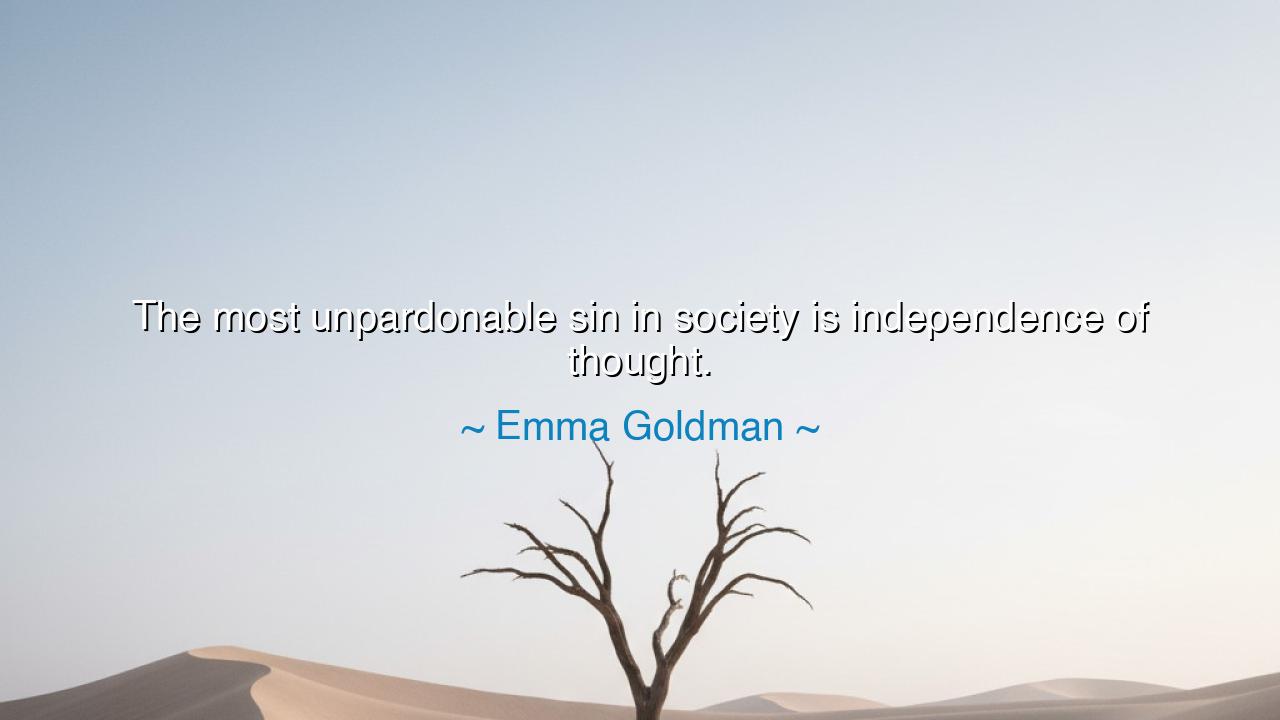
The most unpardonable sin in society is independence of thought.






Hear the fearless voice of Emma Goldman, the woman the world once called dangerous because she dared to think: “The most unpardonable sin in society is independence of thought.” In these words burns a fire that has kindled revolutions, shaken tyrannies, and awakened sleeping minds. For Goldman, a daughter of struggle and exile, spoke not as a dreamer but as one who had lived the price of truth. Her message cuts to the core of human bondage — that while societies speak of freedom, they fear above all the free thinker. The independent mind is not a criminal in law, but it is a heretic in custom, a stranger in the land of conformity.
The origin of this quote lies in the life of Emma Goldman herself, an anarchist, writer, and orator who lived through the storms of the late 19th and early 20th centuries. She was born in Russia, under the shadow of autocracy, and came to America in search of liberty. Yet here too she found chains — not of iron, but of opinion and convention. She fought for laborers, for women’s rights, for freedom of speech, and for the dignity of the individual mind. For this, she was imprisoned, vilified, and ultimately exiled. Her “sin” was not violence, but independence of thought — the refusal to believe what she was told merely because others believed it. She understood that societies, whether monarchies or democracies, often value obedience more than truth, and uniformity more than wisdom.
To call independent thought a sin is to expose the hypocrisy of civilization. Every age crowns its thinkers only after first crucifying them. Socrates drank hemlock because Athens could not bear the sting of his questions. Galileo was forced to renounce his discoveries because the Church could not accept a universe that defied its theology. Giordano Bruno was burned for seeing the stars as suns, and Rosa Luxemburg was silenced for speaking of freedom in the face of empire. The pattern is eternal: the first reaction to truth is outrage, the second is persecution, the third — only centuries later — is reverence. Thus, Goldman’s words are not an indictment of her own age alone, but of the weakness of human nature, which fears the light it most needs.
She called independence of thought a sin because it overturns the order upon which society rests. The free thinker is not easily governed. He questions authority, challenges tradition, and refuses to be tamed by fear or fashion. The rulers of every age, whether kings or bureaucrats, know this — that a single thinking mind is more dangerous than a thousand obedient ones. And so, from childhood, society trains its citizens not to think too deeply, not to question too boldly, not to differ too openly. It offers comfort in exchange for compliance, applause in exchange for conformity. But Goldman reminds us that the cost of this bargain is the soul itself. For what is a life lived without the liberty of thought, if not a living death?
Yet the path of the independent thinker is not without suffering. To think freely is to stand alone. To speak truth is to invite hostility. Emma Goldman knew this intimately — hounded by the press, betrayed by allies, condemned by her nation. But she also knew that solitude is the price of authenticity, and persecution the proof of integrity. The ancients, too, honored this truth. Diogenes, the philosopher who lived in a barrel, defied kings and mocked the vanity of men; when Alexander the Great offered him riches, Diogenes replied only, “Stand out of my sunlight.” Such defiance was not arrogance — it was purity of spirit. To think independently is to claim one’s soul back from the mob, and to live by one’s own light, however dim it may seem in the eyes of the world.
In this sense, Goldman’s “unpardonable sin” is also the highest virtue. It is the seed from which all progress grows. Every new idea — every invention, every movement for justice, every work of genius — begins as a heresy in the minds of the few. Without independent thought, there would be no art, no science, no freedom, no moral growth. Yet even today, the same fear persists. Society praises originality in word, but punishes it in deed. It decorates the graves of its rebels while condemning the living ones. The true education of the soul, therefore, lies in learning to think despite fear — to honor the truth even when it isolates, to question even when it costs.
O listener, take this teaching into your heart. Do not seek comfort in the approval of others, for the applause of the crowd is fleeting, and their love often conditional. Instead, seek the quiet strength of independent thought, for it is the fountain of all dignity. Think deeply, question bravely, and speak honestly — even when your voice trembles. Cherish truth more than acceptance, and conscience more than convenience. The world may call you rebellious, impractical, or proud — but history will call you free.
Thus let Emma Goldman’s words echo through the corridors of time: “The most unpardonable sin in society is independence of thought.” Remember that the mind which dares to think for itself is both the first target of tyranny and the last hope of humanity. So live as the ancients counseled: let your reason be your compass, your conscience your shield, and your courage your flame. For though society may never pardon the free thinker, eternity surely will.






AAdministratorAdministrator
Welcome, honored guests. Please leave a comment, we will respond soon